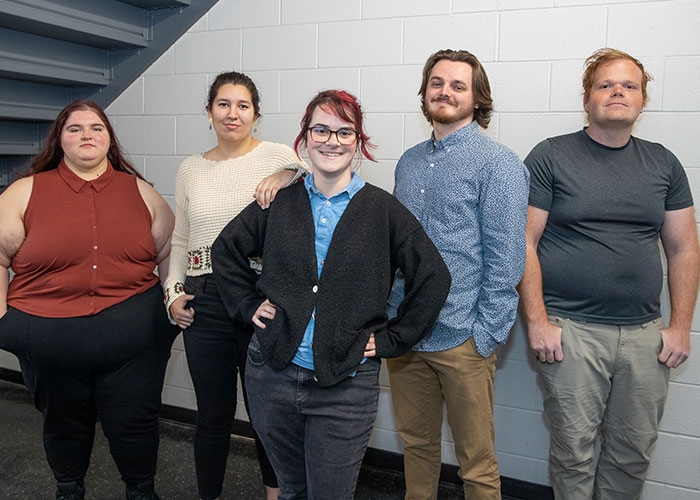MEET OUR GRADUATES: Data Science Students Take on Data-Centric World

“I can’t wait to see them go out into the world and then come back and share their experiences,” says Associate Professor Pinheiro (top left).
This May the Rhode Island College Department of Mathematical Sciences will graduate its first group of data science majors. They will enter one of the most in-demand careers in the country, with one of the highest median salaries – $108,020 (U.S. Bureau of Labor Statistics).

Associate Professor of Mathematics Leonardo Pinheiro was instrumental in the creation of RIC’s B.S. degree in data science five years ago.
Data science, he explains, is a mixture of computer science, statistics and math. With the explosion of “big data,” data scientists are at a premium.
They’re able to process vast quantities of data and utilize advanced algorithms to help companies make data-driven decisions.
At RIC, data science majors start off with courses in statistics, calculus and computer programming. Along the way, they study linear algebra, advanced statistical methods and machine learning, all while deepening their proficiency in the use of a wide range of computer software.
Their study culminates in a senior seminar, the capstone course for the program, taught by Pinheiro (affectionately called “Dr. P” by his students). In seminar, seniors tackle real-world, big data problems – each student picks a data set that is of interest to them and applies the techniques they’ve learned.

Geoff Sargent is big into sports stats, so he applied R programming language on an NFL data set. Kathryn Faria is a psych and data science double major. She collected her data set from a psych research study she did on student work/life balance. The data set Laura Valderrama worked with was college tuitions. And Ash Wolski’s data set consisted of tens of thousands of websites to find out whether or not they’re legitimate or phishing sites.
Though Marcel Lemery is not a data science major but a graduate student in mathematics, he’s taken almost every data science course required by the major, including the seminar.
“I recommend that students in all majors take a data science class or double major or minor in data science,” he says, “because it’s useful to pretty much everyone.”
“Any career that has data in the title, we’re able to work in it,” adds Valderrama.
“And our professors at RIC have done a really good job of preparing us for a future career,” says Faria. “They’re as passionate about this program as the students are, and they’re always available. They care about you and your education. If we were at a bigger school, I don’t think we would get that level of care and attention.”
Pinheiro acknowledges that RIC’s program is small, being only five years old. “But with our low student-to-teacher ratio, we’re able to give our students personalized attention,” he says. “My office door is always open. Students can stop by any time. I can’t wait to see them go out into the world and come back and share their experiences.”
From startups to Fortune 500s, from universities to government agencies, organizations are capitalizing on big data, and they’ll need data scientists to help them make informed decisions. Pinherio has no doubt that his protégés are equipped with the essential skills they need to excel in an increasingly data-centric world.
To learn more about the data science B.S. and minor, visit the Department of Mathematical Sciences.
